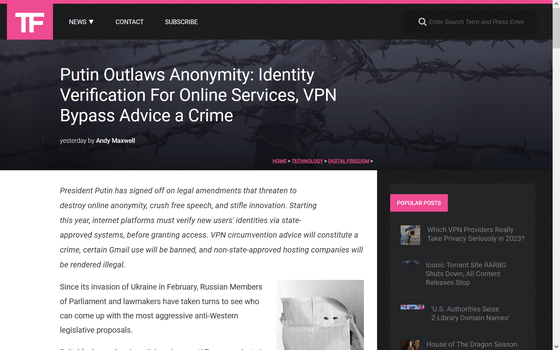President Putin signed a Russian law that stipulates that ``personal identification is required when registering for Internet services and the use of Gmail etc. is prohibited'' and ``advice on VPN is illegal''

When registering for Internet services, it is common to register an e-mail address and password, but in addition to these, Russia is trying to obtain accurate personal information of users. According to the Russian Federation law approved by President Vladimir Putin on July 31, 2023, users will be required to prove their identity when registering for new Internet services.
Putin Outlaws Anonymity: Identity Verification For Online Services, VPN Bypass Advice a Crime * TorrentFreak

According to Russian (PDF file)
This is not as simple as sending a verification link to a company-operated email account, but only to users who can accurately prove who they are using a government-approved 'verification mechanism'. shall be permitted to provide

One method of verification is to use a mobile phone number obtained through an already established process. When the user communicates this phone number to the operator of the online platform or website, an identity verification contract is made, and the operator will be able to allow the user to use the service. In addition, the phone number obtained in this process is also linked to the address.
Another option for operators is to verify users through a federal government platform known as the Unified System of Identification and Authentication. A related bill passed in December 2022 permits the use of biometric data to identify and authenticate citizens.
A final option is to utilize an authentication system operated by a third-party platform that already complies with government rules and regulations. These platforms must be owned by Russian citizens without citizenship of other countries and must be managed by people who meet the same criteria.

In addition to the above provisions, registering on Russian platforms using 'foreign email systems' such as Gmail and iCloud mail will also be prohibited.
In addition, Russia is also keeping an eye on the use of VPNs (virtual private networks) to avoid such enclosures. While Russia does not have a blanket ban on VPN providers and similar services, the legislative change amounts to advising on how to use VPNs, Tor, and other similar tools to evade lockdown. It would be considered a crime to post any information online.

Similar regulations are imposed on hosting providers. Legislative changes will require hosting providers to register with the government for a license to operate, and once licensed, will receive a list of prohibited activities, types of content, and specific conduct. Hosting providers are required to take measures to eliminate violations in accordance with this list and report the results to the authorities, otherwise they will be deregistered and will not be able to do business in Russia. increase.
These measures came after Russia's invasion of Ukraine and are aimed at controlling the country's internet. Online platforms must follow strict identity verification procedures and hosting providers must obtain state licenses to operate, limiting privacy and freedom of expression. TorrentFreak, which handles BitTorrent and copyright-related news, pointed out that ``these measures will have a serious impact on Russian Internet entrepreneurs, citizen privacy, and press freedom.''
Related Posts:
in Web Service, Security, Posted by log1p_kr







